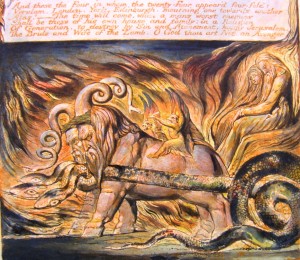Patrick White’s Riders in the Chariot begins with a quote from Blake’s The Marriage of Heaven and Hell. Blake quotes the prophets Isaiah and Ezekiel in their roles as prophets decrying the materialism of the world in which they live and demonstrating how it is possible to discover the infinite in everything. Theirs is a cry of lamentation at a world gone wrong, but it is also a cry of hope for the renewal of a humanity that can learn to live in a right relation with the world and with everyone in it. This is of course William Blake’s cry to the world of the late 18th and early 19th Century at the height of the industrial revolution; it is also Patrick White’s cry at the spiritual desert of Australia that he discovered on his return home after 20 years in England . As he puts it in his essay “The Prodigal Son“:
In all directions stretched the Great Australian Emptiness, in which the mind is the least of possessions, in which the rich man is the important man… in which beautiful youths and girls stare at life through blind eyes, in which human teeth fall like human leaves, the buttocks of cars grow hourly glassier, food means cake and steak, muscles prevail, and the march of material ugliness does not raise a quiver from the average nerves…. Because the void I had to fill was so immense, I wanted to try to suggest in this book every possible aspect of life, through the lives of an ordinary man and woman. But at the same time I wanted to discover the extraordinary behind the ordinary, the mystery and the poetry which alone could make bearable the lives of such people, and incidentally, my own life since my return.
So here was Patrick White’s blueprint for the novels he would produce over the next twenty years: The Tree of Man, Voss, Riders in the Chariot, The Solid Mandala, The Vivisector…
All these novels would challenge the cultural emptiness of Australia and find a way of exploring how, within that emptiness, there was in fact a core of something very precious, sacred almost, that when recognized, exposed, could transform the whole texture of the Australian landscape. This is in fact precisely what Patrick White succeeded in doing during the remainder of his writing life.
Blog Topics for Week 8
- Write a short paragraph agreeing or disagreeing with Patrick White’s summary of the “Great Australian Emptiness”.
- How can you discover the extraordinary in the ordinary? Give an example of some ordinary object that could be described in such a way as to make it look and feel extraordinary.
- “She started poking at a dry sponge”. Write a short paragraph describing an interaction between two people in a post office. See if you can use some of the odd descriptive techniques that make Patrick White’s prose so unusual and suggestive.
-


